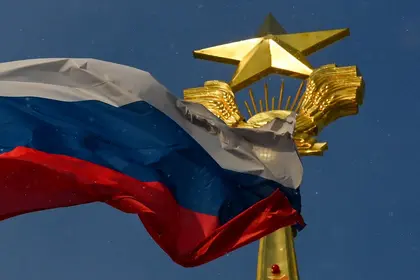The Russian foreign ministry spokeswoman on Saturday announced the expulsion of "more than 20" German diplomats as a retaliatory measure for "mass expulsion" of Russian embassy staff from Berlin.
Her statement came shortly after her ministry denounced "another mass expulsion of employees of Russian diplomatic missions in Germany."
JOIN US ON TELEGRAM
Follow our coverage of the war on the @Kyivpost_official.
The German foreign ministry said it took note of the Russian statements. It told AFP that "the Federal government and the Russian side have been contact in recent weeks on personnel matters in their respective representations abroad."
"Today's flight is part of that process," it said, though without specifically talking about any expulsion.
Moscow accused Berlin of "continuing to demonstratively destroy the entire range of Russia-Germany relations."
"As a response to Berlin's hostile actions, the Russian side has decided to mirror the decision and expel German diplomats from Russia," the foreign ministry said.
Moscow will also limit the maximum number of employees in German diplomatic missions in the country, and said Germany's ambassador Geza Andreas von Geyr was notified of the measures on April 5.
A Washington Post article yesterday indicated that Western intelligence officials had found conclusive evidence that Russia had sought to interfere in German politics by reaching out to both left wing and right wing political parties, who Russia hoped could be abetted in gaining more votes in the next parliamentary elections, and thus being able to reduce Germany's support for Ukraine under the guise of being a "pro-peace coalition."

North Korea’s Ballistic Missile with 1,200–3,000 km Range Spotted in Russia
The two political parties mentioned in the report, the far-left Die Linke Party and far-right Alternative für Deutschland (AfD), have been criticized for years as having, what some consider to be, as pro-Russian leanings.
The Washington Post indicated that Russia had provided political consultants, trips, and gifts to the German politicians with whom it was seeking to help.
Last year, during the early stages of Russia's full-scale invasion of Ukraine, Berlin expelled 40 Russian diplomats.
News reports in March said that Germany was readying the expulsion of 30 Russian diplomats whom the German security services had concluded might be trying to recruit German nationals who worked in business, the sciences, the political arena, the military, or who would spread Russian propaganda or undertake sabotage against German interests.
Germany, which formerly had strong political and economic ties, has taken a greater lead in opposing Putin's war in Ukraine.
You can also highlight the text and press Ctrl + Enter






